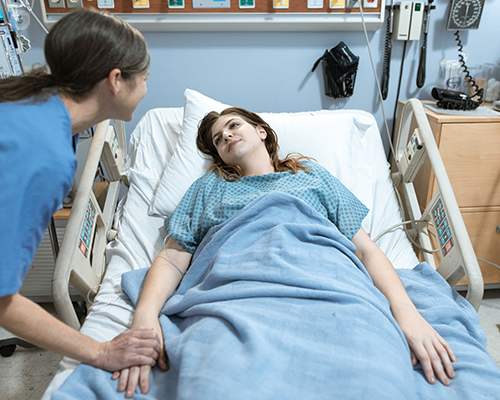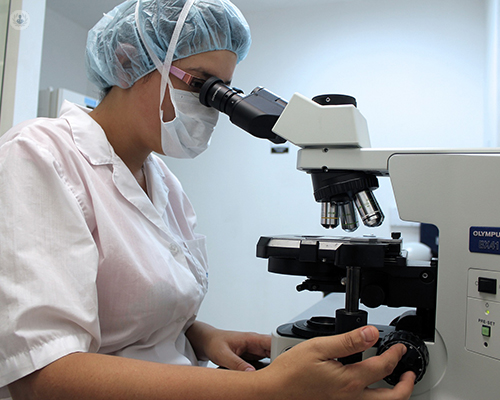An in-depth guide to pancreatic cancer
Written in association with:Approximately 8,800 people are diagnosed with pancreatic cancer in the UK each year. In his latest article, revered clinical oncologist Dr Sherif Raouf offer his expert insight into this type of cancer, including its symptoms, causes and treatment.

What are the symptoms of pancreatic cancer?
Numerous symptoms could indicate pancreatic cancer. These include but are not limited to:
- Abdominal pain that radiates to your back.
- Loss of appetite or unintended weight loss.
- Yellowing of your skin and the whites of your eyes (jaundice)
- Light-coloured stools.
- Dark-coloured urine.
- Itchy skin.
- New diagnosis of diabetes or existing diabetes that's becoming more difficult to control.
- Blood clots.
What are the risk factors for pancreatic cancer?
Several different risk factors can increase our chances of developing pancreatic cancer. These include:
- Age – As we get older, the risk of pancreatic cancer increases.
- Gender – Pancreatic cancer is more commonly diagnosed in men.
- Smoking.
- Obesity, poor diet, and alcohol.
- Diabetes.
- Family history.

How is pancreatic cancer diagnosed?
- Blood tests – there are specific proteins in the blood known as tumour markers that can indicate whether or not one has pancreatic cancer. One such tumour marker test is CA19-9. However, this is not always the most accurate test as some patients who are suffering from pancreatic cancer do not have elevated levels of this protein.
- Endoscopic ultrasound – this involves using an ultrasound device to provide images of your pancreas from within your abdomen.

- Imaging tests – these tests can provide doctors with images of your internal organs, including the pancreas. Different options include CT scans, MRIs or positron emission tomography (PET) scans.
- Biopsy – your doctor may also remove a small sample of tissue (biopsy), to be examined under a microscope. This can also detect cancerous cells. Mostly this is done with the use of an endoscope, or sometimes a needle.
How is pancreatic cancer treated?
How your pancreatic cancer is treated will depend on what stage the tumour is at.
Surgery – this is considered the main way in which pancreatic cancer is treated. There are several different types of surgery, depending on where the cancer is located. This could include surgery for tumours in the pancreatic head, body or tail.
If it is for cancer affecting the pancreatic head, the head is removed along with the duodenum, and gallbladder, among other structures close to the pancreas. It is quite a complex procedure.
If the cancer is in the left side (body and tail) of the pancreas, then this section will be removed. Sometimes the spleen will have to be removed as well.

In some cases, the entire pancreas will need to be removed. Following this procedure, the patient will require insulin and enzyme replacement for the rest of their life.
If the tumour is affecting nearby blood vessels, the patient is usually offered chemotherapy, and sometimes chemoradiotherapy. The aim of this is to push the tumour away from blood vessels which will then allow a surgeon to safely operate.
Chemotherapy – Chemotherapy is another possible treatment option. This is the use of drugs to kill cancer cells. Patients can receive either one drug or a combination of drugs. Chemotherapy is often done before surgery to shrink the tumours and make it easier to operate. It can also be given after surgery to decrease the likelihood of the tumours recurring.

Radiation therapy – another pancreatic cancer treatment with a high success rate is radiation therapy. This treatment method uses high-energy beams, similar to x-rays, to destroy the cancer cells.
There are two different methods: VMAT and SABR:
- VMAT involves a machine moving around your body to hit specific parts of your body with radiation.
- SABR involves using an MRI-guided machine to provide more accurate tumour control with fewer side effects. This is available for private patients in the UK.
Clinical trials – these are another treatment option and involve clinical trials and tests of different types of therapy. This could include systemic therapy, new surgical techniques or new types of radiation therapy, chemotherapy, immunotherapy or vaccines. These new treatments could become the new standard of care if they prove to be more effective than what is currently used.
Clinical trials are not always successful and may have serious, unexpected side effects. However, they are monitored to ensure they are conducted as safely as possible. Your doctor can tell you if he thinks you may be suitable for a clinical trial.
Currently, we are conducting a clinical trial of drug therapy and SABR in London and Oxford.

Supportive or palliative care:
Palliative care is a type of specialised care that aims to relieve pain and other severe sickness symptoms. Hospice care and end-of-life care are not the same as palliative care. Teams of doctors, nurses, social workers, and other professionally qualified specialists offer palliative care.
The goal of these teams is to enhance the quality of life of patients and their families.
Specialists in palliative care collaborate with you, your loved ones, and your other doctors to offer an additional level of support that supplements your current medical care. It is frequently utilized in conjunction with invasive procedures like surgery, chemotherapy, and radiation therapy.
Even shortly after the diagnosis, cancer patients may feel better and survive longer when palliative care is used in conjunction with other suitable treatments.
What is the prognosis of pancreatic cancer?
The percentage of patients with the same type and stage of cancer who are still alive five years (or more) after their diagnosis can be determined by looking at survival rates. While they can't predict how long you'll survive, they might be able to give you a better idea of the likelihood that your therapy will be effective.
- Localized: The pancreatic cancer does not appear to have spread elsewhere. 5-year Relative Survival Rate 42%
- Regional: The pancreatic cancer has spread to neighbouring tissues or lymph nodes. 5-year Relative Survival Rate 14%
- Distant: The cancer has progressed to organs like the lungs, liver, or bones that are in other areas of the body. 5-year Relative Survival Rate 3%
Dr Sherif Raouf is a leading consultant clinical oncologist based in London, Essex& Buckhurst Hill. If you would like to book a consultation with Dr Raouf you can do so today via his Top Doctors profile.



